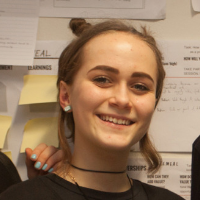27 Sep 2018
Eva Rosa Morey
The Youth Empowerment Revolution: Part One

Seeing the Young Change Agents program through the eyes of a young person.
As a young person, it is often easy to forget that your voice deserves to be heard. The wildly imaginative aspirations of our early childhood are so soon stamped out by an urgent, oppressive need to be ‘realistic’, brought about at the same time as the acne and bad haircuts of adolescence begin to take hold. This sudden, crushing realisation — that your dreams of becoming an astrophysicist or a professional ballerina are just too far out of reach — is radically disempowering for a young person. You are expected to go out into the world of huge, grown up problems with the belief that you are too young and thus too insignificant to do anything about them.
It’s really scary.
But it only takes three days to prove this whole idea wrong.
Going into the Young Change Agents program, I was unsure of what to expect. When everyone was asked to raise their hand if they knew what a social enterprise was, I did that thing where I kind of raised my arm halfway and flopped it around limply to indicate my lack of confidence. What I didn’t know then, but I can tell you now, is that a social enterprise is basically the fusion of a business and a charity; an organisation that uses a business model and commercial strategies but is dedicated to intentionally tackling social problems. Pretty epic.
In my team were my two of my school friends, another girl from my grade and one girl I’d never met before. By some miracle, we all clicked almost instantly, and incredibly well — bringing a well-rounded, diverse range of skills and interests to the table.
I don’t think that I’ve ever learnt more over a two day timespan. Over the two days, I was bombarded with a stream of real world business terms that I’d never heard of before: Social lean canvas! Key metrics! Market validation! and a series of intensively focused strategising sessions that pushed my mental capacity to its limits. However, a couple of minutes of confusion would always give way to a some kind of epic lightbulb moment — I could feel these terms settling into place in my head with satisfying clicks as the activities went on. I felt capable. All these huge issues that I had always knew needed fixing but had forever seemed too huge to conquer suddenly felt so entirely conquerable!
Through the process of ideation and root cause analysis, my team developed an idea for a social enterprise called Piecemeal. The premise of Piecemeal was to attempt to combat sweatshop labour in developing countries. We aimed to do this through the creation of a sustainable, unisex clothing brand that would sell t-shirts made in ethical spaces in developing communities, providing an alternative source of employment for workers that would otherwise be forced into the damaging sweatshop industry. Each clothing item would feature a scannable link to the story of an individual who had created that item of clothing, bridging the gap between consumer and producer.
Thanks to the dedicated guidance of our mentors and the program facilitators, our ability to perform so effectively as a group and the immense amount of dedicated effort we were able to contribute to our cause, Piecemeal managed to win every single mini challenge we were presented with, and then later the final pitch as well as the people’s choice. This will forever be one of my proudest achievements — but even more so than this, the amount of confidence and value I’ve gained as a result of this program has completely altered my view of myself as a young woman in the world. I know now that the fact that I am a young person does not in any way hinder the impact I am able to have, or devalue any of my input. In fact, it might just be the catalyst in my journey as an agent of change.

